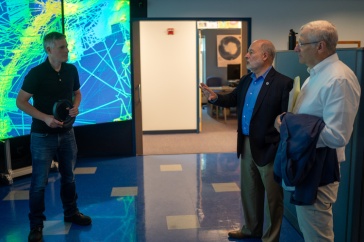
The Arctic is melting. Is it time to panic?
That’s what a panel of international researchers, including UNH's Larry Mayer and Nancy Kinner, will discuss Tuesday, April 9, at 4 p.m. in Huddleston Hall. The seminar, which is free and open to the public, will address how scientists and the public can confront the challenges and opportunities of Arctic change.
Public perception and news media coverage have recently caught up with what scientists have known for decades: The Arctic is warming much faster than the rest of the planet. In this panel, Arctic researchers from the U.S., Sweden and Japan will share their firsthand experiences with Arctic change. How have each of these researchers experienced Arctic change in their own fields? Which implications of melting sea ice, glacier calving or thawing permafrost are they most concerned about? What challenges and opportunities do these unprecedented changes present to communities living and working in the Arctic?

Panelists:
- Larry Mayer, director of UNH’s Center for Coastal and Ocean Mapping and School of Marine Science and Ocean Engineering
- Miyase Christensen, professor of media and communication studies at Stockholm University
- Niklas Eklund, associate professor of political science at Ume? University
- Nina Kirchner, director of research at the Bolin Centre for Climate Research and associate professor of glaciology, at Stockholm University
- Hideaki Murayama, professor at the Graduate School of Frontier Sciences, University of Tokyo
- Nancy Kinner, professor of civil and environmental engineering and director of UNH’s Coastal Response Research Center, moderator
“This panel will engage the audience to consider how we can all help ensure sustainable development of the New Arctic.”
The panelists are all members of the Arctic Science IntegrAtion Quest (ASIAQ), a project that unites six universities (UNH, Sweden's Stockhom University, Umea University and KTH Royal Institute of Technology, University of Tokyo and NARFU in Russia) in a joint endeavor to advance research and education for a sustainable Arctic. This seminar closes a two-day ASIAQ workshop hosted at UNH.
“Ultimately, we need to understand both the local and global impacts of Arctic change, including how it is affecting our own communities, whether in New Hampshire, Stockholm or Tokyo,” says Jessica Ernakovich, assistant professor of natural resources and the environment at UNH and an ASIAQ member. “This panel will engage the audience to consider how we can all help ensure sustainable development of the New Arctic.”
The event is co-sponsored by ASIAQ and Stockholm University as well as the UNH School of Marine Science and Ocean Engineering and the New England Arctic Network.
-
Written By:
Beth Potier | UNH Marketing | beth.potier@unh.edu | 2-1566



















































